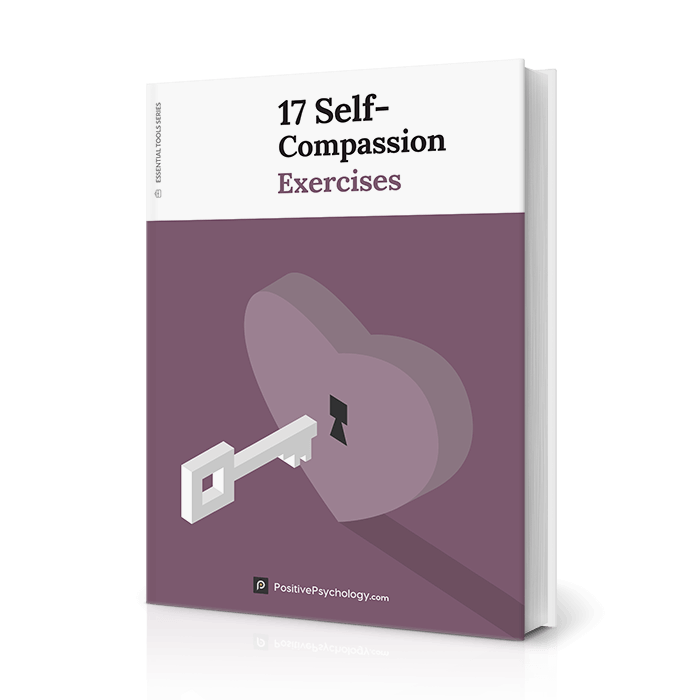

Practicing self-care may be one of the most selfless activities in which we engage.
For professionals working toward others’ psychological wellness, where emotional costs can be considerable, self-compassion, self-awareness, and healing are essential (Delgadillo, Saxon, & Barkham, 2018).
Not only is self-care critical for the wellbeing of the therapist, counselor, or psychologist, it also impacts patient outcome (Pereira, Barkham, Kellett, & Saxon, 2017).
So how do you reduce burnout and emotional exhaustion when time, energy, and financial resources are limited?
This article explores small but crucial habit-forming changes that have a significant impact personally and professionally when caring for others (Bush, 2015).
Before continuing, we thought you might like to download our three Self-Compassion Exercises for free. These detailed, science-based exercises will help you increase the compassion and kindness you show yourself and give you the tools to help your clients, students, or employees show more compassion to themselves.
We often ignore the impact an individual’s mental health problem has on those around them, but it is very real.
Research has shown that parents of children with mental illnesses are themselves at risk of developing mental health issues and report a range of negative emotions including self-blame, anger, and frustration (Arbuthnott & Lewis, 2015).
Without adequate care, the mental health professional is equally at risk of “burnout, vicarious trauma, and compassion fatigue,” says Ashley Davis Bush (2015). And while the warning is stark, it is of genuine concern for anyone whose focus is others’ wellbeing.
A report from 1990 found that nurses, therapists, social workers, and psychologists in psychiatric hospitals faced high occupational burnout levels, increased psychological health problems, and lowered job satisfaction (Hiscott & Connop, 1990).
More recently, research recognized that burnout among mental health professionals, while of significant concern personally, may also affect their clients’ treatment. Findings suggest that providing therapy can be challenging and emotionally taxing, potentially leading to “vicarious traumatization and secondary traumatic stress” (Delgadillo et al., 2018).
Not only that, occupational burnout can result from extreme emotional exhaustion caused by empathically supporting people in severe distress (known as compassion fatigue) and is made worse by increasing workload and time pressures (Delgadillo et al., 2018).
However, like their clients, professionals’ mental health can benefit from training and interventions, and ultimately improve patient outcomes (Pereira et al., 2017).

With between 21% and 67% of mental health workers experiencing occupational burnout, it is paramount that therapists, psychologists, and counselors take care of themselves while looking after others’ needs (Delgadillo et al., 2018).
“Being kind to yourself is one of the greatest kindnesses.”
However, self-care can mean different things to different people. While some may picture self-care as a glass (or two) of wine beside a roaring fire in the middle of winter, for others, it is time spent by the water with nothing to do but work through a pile of beach reads. And that’s okay; we are all different.
In Simple Self-Care for Therapists, Ashley Davis Bush (2015) describes macro self-care as “the important traditional category of self-care that includes the big stuff,” such as eating well, getting enough exercise, taking a vacation, and forming positive relationships.
However, while essential to our wellbeing, such interventions require a significant commitment of time, energy, and, all too often, money.
On the other hand, micro self-care refers to “practices that are simple enough to fit into your existing schedule, your current energy level, and your budget.” Implementing such small changes to your life can nudge your brain toward being more aware and serene and cause positive changes to your thinking (Bush, 2015).
So, let’s take a closer look at both.
Broadly speaking, macro self-scare falls into four categories, equally valuable for therapist and client (Bush, 2015).
In the absence of good health, life can be a struggle, impacting our emotions, cognition, and behavior.
The necessity of good sleep is widely accepted and impacted by sleep hygiene (the practices performed around sleep), the environment, use of stimulants, and the amount of sleep (Puentes-Mestril & Aton, 2017).
Exercise is equally important to both physical and mental wellness (Kalak et al., 2012). Keeping physically fit slows the aging process, keeps our cognitive processes sharp, and supports a healthy immune system.
The food we eat further affects our wellbeing, and maintaining a healthy balanced diet is advisable for our physical and mental health (LaChance & Ramsey, 2015).
Taking time off is crucial for the body and mind to break from routine and recover from overload. According to the American Psychological Association (2018), while the benefits may only last for a brief spell, “taking time off helps most U.S. workers recover from stress and experience positive effects that improve their wellbeing and job performance.”
All areas of our lives must receive the attention required to meet our needs, avoiding unhelpful, excessive focus on one or two aspects at the cost of others (Bush, 2015).
Unhealthy relationships are often the subject of discussion in therapy and can negatively impact growth and healing (Hannah & Luquet, 2005). A positive relationship is just as beneficial for the mental health professional as their client.
Hobbies provide a positive focus for our interests and the opportunity to foster our individuality, self-expression, and creativity.
Being part of a community and involvement in spiritual practices (though not necessarily religious) can help us develop a healthy relationship with others and ourselves.
Life’s little pleasures provide color, excitement, and an element of spontaneity to our days.
“Pepper your life with small rewards and simple pleasures that scream loudly celebration! (or whisper quietly, yum).”
So, why don’t we engage in macro self-care all the time?
Many mental health professionals don’t have the time, finances, or other resources for adequate macro self-care. They may feel that taking time and effort to look after themselves is a luxury or, at worst, uncaring when we consider others’ suffering.
And yet, not looking after ourselves could be an act of selfishness. If we burn out, we will not be available to help anyone. Working daily with those who are suffering while being emotionally overloaded and experiencing compassion fatigue will not benefit our clients.
The crucial question is, then, how do we look after ourselves in a manageable and sustainable way?
Micro self-care provides a way for busy professionals (possibly with the added challenge of a family and other commitments) to fit self-care into their lives.
Such techniques are low cost, financially and in terms of other resources, and can be built into our everyday lives; for example, when (Bush, 2015):

These detailed, science-based exercises will equip you to help others create a kinder and more nurturing relationship with themselves.
Download PDF
By filling out your name and email address below.
Based on Bush’s (2015) concept of micro self-care, the following strategies are valuable for taking care of yourself daily and managing stress.
Feeling love is a grounding practice to create feelings of connectedness and love, helping to train the brain to be better able to both give and receive love:
Visualize love flowing in and out of you as part of an endless cycle, including you and those you care about.
Circle of care is an energizing exercise to feel more connected with a broader community of helpers (Bush, 2015).
Being part of something bigger, developing relationships, and knowing you have a positive impact can make a big difference to feelings of connectivity while reducing your sense of isolation.
This exercise is an easy-to-implement yet valuable mini-intervention that fits nicely into regular day-to-day activities.

The Positive Psychology Toolkit© is a groundbreaking practitioner resource containing over 500 science-based exercises, activities, interventions, questionnaires, and assessments created by experts using the latest positive psychology research.
Updated monthly. 100% Science-based.
“The best positive psychology resource out there!”
— Emiliya Zhivotovskaya, Flourishing Center CEO
The positive effects of breathing techniques – typically involving an out-breath that is longer than the in-breath – are well known and can provide an immediate calming effect on our central nervous system, making us less reactive (Nestor, 2020).
You can easily perform this exercise in almost any situation. It can be repeated several times for an urgent reset or over a prolonged period for more profound, more effective relaxation.
Setting an intention for each day can be self-fulfilling and may be best performed upon waking up or when sitting and having a favorite drink (Bush, 2015).
Touch is crucial to each of us, and even hugging ourselves can reduce physical and emotional pain while providing feelings of safety (Bush, 2015).
This technique can be especially valuable either before a session when feeling nervous or after when feeling you have failed a patient.
Mindfulness can be incredibly beneficial cognitively, emotionally, and physically. As therapists, we often prescribe such techniques to our clients, yet we must not forget their benefit to ourselves personally and professionally.
A tour of the five senses is one such technique (Bush, 2015).
Remain in this moment, appreciating how amazing your body is and how it interacts with the environment surrounding you.
Bush (2015) provides this self-reflection exercise as a technique for increasing our gratitude in life. Through making friends with impermanence, we are less likely to take what we have for granted.
It is here now, but it will pass, as do all things.
An awareness of death need not be negative. Instead, it can provide energy and invigoration to life.
Ashley Bush provides many other such wonderful micro self-care techniques in her book Simple Self-Care for Therapists (2015) that can be repeated and alternated when needed.
Explore the practices and build a good level of self-care into your day. Not only will you feel better, but they will improve your capacity for empathy and provide more clarity when helping others.

Help your clients develop a kinder, more accepting relationship with themselves using these 17 Self-Compassion Exercises [PDF] that promote self-care and self-compassion.
Created by Experts. 100% Science-based.
We have many tools and techniques to encourage self-awareness, relaxation, and learning. They can all help you feel calm, grounded, and present. Try out a few of the following at the start, end, or in gaps during the day.
Besides these excellent exercises, we also have a selection of 23 self-care activities for groups, 10 additional self-care worksheets, and the self-care wheel, which provides practical insight into practicing self-care.
If you’re looking for more science-based ways to help others develop self-compassion, this collection contains 17 validated self-compassion tools for practitioners. Use them to help others create a kinder and more nurturing relationship with the self.
Burnout in mental health professionals is a genuine problem, impacting their own wellbeing and that of their clients (Delgadillo et al., 2018).
Research suggests that the state of a therapist’s wellbeing is vital to their ability to perform and may go some way to explain the variability of outcomes in treating clients (Pereira et al., 2017).
Taking care of yourself is not selfish. Failing to look after your wellbeing (mental and physical) is damaging to your clients and those around you.
By maintaining your wellness and a positive, open state of mind, you can better look after others’ needs and avoid vicarious trauma or empathy overload.
As Bush (2015) writes, “self-love (and the care for that self) is the core prerequisite for all other relationships.” It is not merely a nice-to-have, but an essential practice to ensure clarity and fullness in helping others. Without nurturing growth as a helper, you are unlikely to achieve your potential in helping others with their mental wellbeing.
With inevitable challenges, be they financial, time, or related to other resources, self-care, especially at a micro level, is invaluable (Bush, 2015).
The practices contained within this article can easily be accommodated into the busiest of days and add self-care moments that may otherwise be lost, benefiting both therapist and client.
We hope you enjoyed reading this article. Don’t forget to download our three Self-Compassion Exercises for free.
References